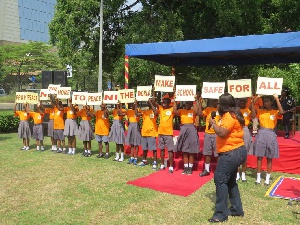The Ministry of Gender, Children and Social Protection has launched a campaign for 16 days of intense activism against gender-based violence focusing on what often pertains at the school setting.
The campaign, which is on the theme: “From Peace in the Home to Peace in the World: Make School Safe for All,” would also be code-named the ‘Orange Day’.
This is to identify with the brightness and optimist colour to call upon activists, governments, and United Nations partners to mobilise people and continually highlight issues relevant to preventing and ending violence against women and girls.
The Orange Day would also be marked every November 25, which is designated as the International Day for the Elimination of Violence against Women.
It also creates a powerful platform to educate the public and governments about gender-based violence, human rights and the intersections of political, economic and social realities.
Nana Oye Lither, the Minister of Gender, Children and Social Protection, said the theme was in direct recognition to the fact that education was a public good and a fundamental human right recognised in Article 26 of the 1948 Universal Declaration on Human Rights, which was upheld in various international and regional human rights conventions and treaties.
According to her, the 16-day campaign begins from November 25, to commence celebrations for the International Day for the Elimination of Violence against Women, and would end on December 10, 2015, to mark the International Human Rights Day.
It involves more than 5,478 organisations and other participants from 187 countries and territories worldwide and calls for an end to gender-based violence and accountability on the part of policy makers and community members to end violence, discrimination and inequality.
She said during the period, emphasis would be laid on the fact that gender-based violence in its many forms constituted a human rights violation, and a direct response to the presently increasing violence against education, especially of young girls and women, as in the case of the forceful abduction of the Chibok school girls in Nigeria.
“We sympathise with girls and women in many parts of the world who, in spite of these conventions, have had their education affected by growing violence and conflict,” she said.
She said evidence indicated that school-based violence affected millions of children and adolescents worldwide, and described it as one of the worst manifestations of gender discrimination, which violated a wide range of children’s rights.
Nana Oye said the government acknowledged the importance of education as a critical tool for empowering and transforming the lives of young people, especially girls, yet widespread gender-based violence in and around schools seriously undermined the achievement of quality, inclusive and equitable education for all children.
“Recent estimates from Plan International (2013), based on the number of children affected by verbal bullying, a common form of violence in schools, show 246 million boys and girls suffering from school-related violence every year,” she said.
On the issue of early or forced marriages as forms of violations against women, she said it currently affected about 14 million adolescents worldwide, with other researches indicating potential increases in the near future.
Nana Oye said in response to these challenges, the Government through the Gender Ministry, and in collaboration with the United Nation’s Population Fund (UNFPA), had set up gender-based violence response centres at Agbogbloshie and Mallam-Atta Markets in Accra to provide comprehensive packages of integrated medical, legal and psychological support to victims and survivors of gender-based violence.
It would be expanding the facility to other places country wide.
She said the Gender Ministry had also instituted the necessary legal and policy framework to address issues that affected women’s rights, and called on stakeholders to concentrate their energies on issues that worked against women and children.
An Assistant Commissioner of Police, Habiba Twumasi Sarpong, the National Coordinator at the Domestic Violence and Victim Support Division of the Ghana Police Service, appealed to the public to collaborate with authorities by reporting perpetrators of gender-based violence in order to reduce the staggering statistics.
Other collaborators including ActionAid Ghana, the UNFPA, DOVVSU and other child rights organisations operating in the country pledged their commitment towards the campaign to eliminate the menace.
Regional News of Thursday, 26 November 2015
Source: GNA













